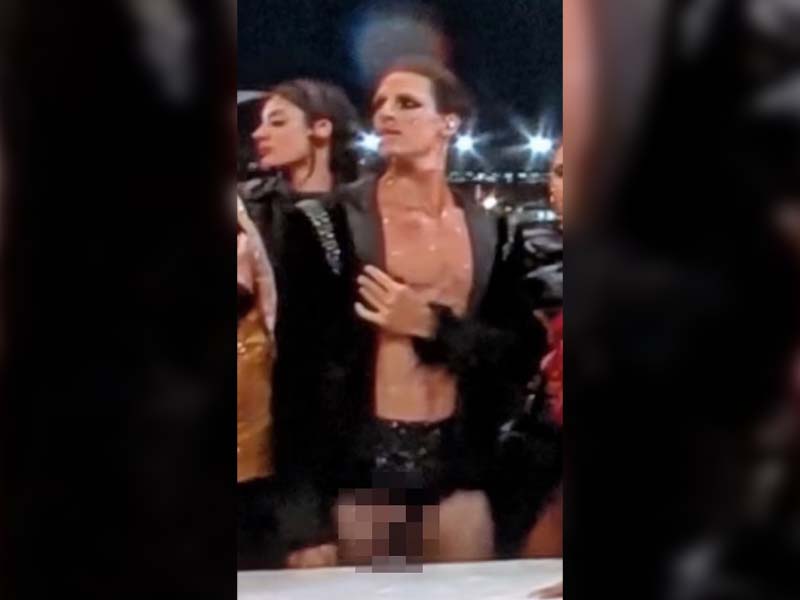
TRENTON, NJ (OP-ED) – The Olympics have long been a celebration of global unity, athletic excellence, and cultural exchange. They provide a rare opportunity for nations to come together in the spirit of competition and camaraderie.
However, the opening ceremony of the Paris 2024 Olympics has left many viewers shocked and appalled, not for its grandiosity or artistic innovation, but for its blatant mockery of Christianity, featuring a Last Supper reenactment with drag queens, including one with his genitals exposed on national television.
This obscene display was not just an affront to Christian sensibilities but a disturbing example of how cultural insensitivity and sensationalism have taken precedence over respect and reverence.

The ceremony, which should have been a showcase of France’s rich cultural heritage and a warm welcome to the world’s athletes, instead devolved into a controversial and divisive spectacle.
A Misguided Attempt at Inclusivity
The inclusion of drag queens in the opening ceremony was, presumably, intended as a statement of inclusivity and celebration of diversity.
Drag culture, with its roots in LGBTQ+ expression and resistance, certainly deserves recognition and respect. However, the decision to juxtapose this with a parody of one of Christianity’s most sacred scenes—the Last Supper—was a gross miscalculation.
For many Christians, the Last Supper is not just a historical event but a foundational moment of their faith, symbolizing Jesus Christ’s sacrifice and the establishment of the Holy Eucharist. To see this sacred moment trivialized with drag performers, particularly in such a crude and vulgar manner, was deeply offensive.

Freedom of Expression vs. Respect for Beliefs
In democratic societies, freedom of expression is a fundamental right. Artistic performances often push boundaries and challenge societal norms. However, this freedom comes with the responsibility to avoid unnecessary provocation and respect deeply held beliefs. The Paris Olympics opening ceremony crossed this line, not only by ridiculing a religious icon but also by doing so in a manner that was overtly disrespectful and inappropriate for a global audience.
The exposure of a performer’s genitals on national television only added to the outrage. Such an act is not only indecent but also highlights a complete disregard for the event’s diverse viewership, which includes families and children. This lapse in judgment by the organizers has rightly drawn widespread condemnation.
Cultural Sensitivity and Global Audiences
The Olympics are a global event watched by millions across different cultures and religious backgrounds. The opening ceremony should be a reflection of the host nation’s culture, values, and hospitality. France, a country known for its artistic prowess and cultural depth, had the opportunity to present a performance that could inspire and unite. Instead, it chose to engage in a provocative display that alienated and offended a significant portion of its audience.
This incident underscores the importance of cultural sensitivity, especially in events of such international significance. Organizers must strike a balance between artistic expression and respect for the diverse values and beliefs of the global community. Failure to do so not only tarnishes the reputation of the event but also damages the host nation’s standing on the world stage.
The Role of Media and Public Reaction
The media’s role in covering and critiquing such events is crucial. While some outlets have lauded the performance for its boldness, many have rightly criticized it for its insensitivity and poor taste. Public reaction has been overwhelmingly negative, with social media platforms flooded with expressions of outrage and disappointment.
It is essential for the media to hold organizers accountable and ensure that such missteps are not repeated. Constructive criticism and open dialogue can help prevent future occurrences and promote a more respectful and inclusive approach to global events.
Moving Forward: Lessons to Learn
The Paris Olympics opening ceremony should serve as a wake-up call for event organizers and cultural curators worldwide. The lessons are clear:
- Respect for Diversity: Inclusivity should celebrate all cultures and beliefs without mocking or trivializing any. Genuine respect for diversity means understanding and honoring the sacred elements of all religions and traditions.
- Cultural Sensitivity: Organizers of global events must prioritize cultural sensitivity, recognizing the varied backgrounds and values of their audience. Artistic expression should inspire and unite, not provoke and divide.
- Accountability: There must be mechanisms in place to review and approve content for such significant events, ensuring that performances are appropriate for a global audience and do not cross lines of decency and respect.
- Dialogue and Education: Open dialogue between cultural representatives and organizers can help bridge understanding and prevent cultural missteps. Education about different religious and cultural sensitivities should be integral to planning global events.
The Paris 2024 Olympics should have been a celebration of unity and human excellence. Instead, the opening ceremony’s offensive portrayal of the Last Supper and the inappropriate conduct of performers have overshadowed the spirit of the Games. It is a stark reminder that while artistic expression is vital, it must always be balanced with respect for the diverse beliefs and values of a global audience. As the world continues to grapple with issues of inclusion and respect, let this be a lesson in the importance of cultural sensitivity and mutual respect.
This concludes the 2024 coverage of the Paris Olympics.

